Calling all newbie grill masters! If you’re ready to dive into the world of using wood chips in your smoker, you’re in for a treat! This guide will provide an in-depth look into how to smoke with wood chips in charcoal and pellet smokers, tips and tricks for smoky perfection, and safety precautions.
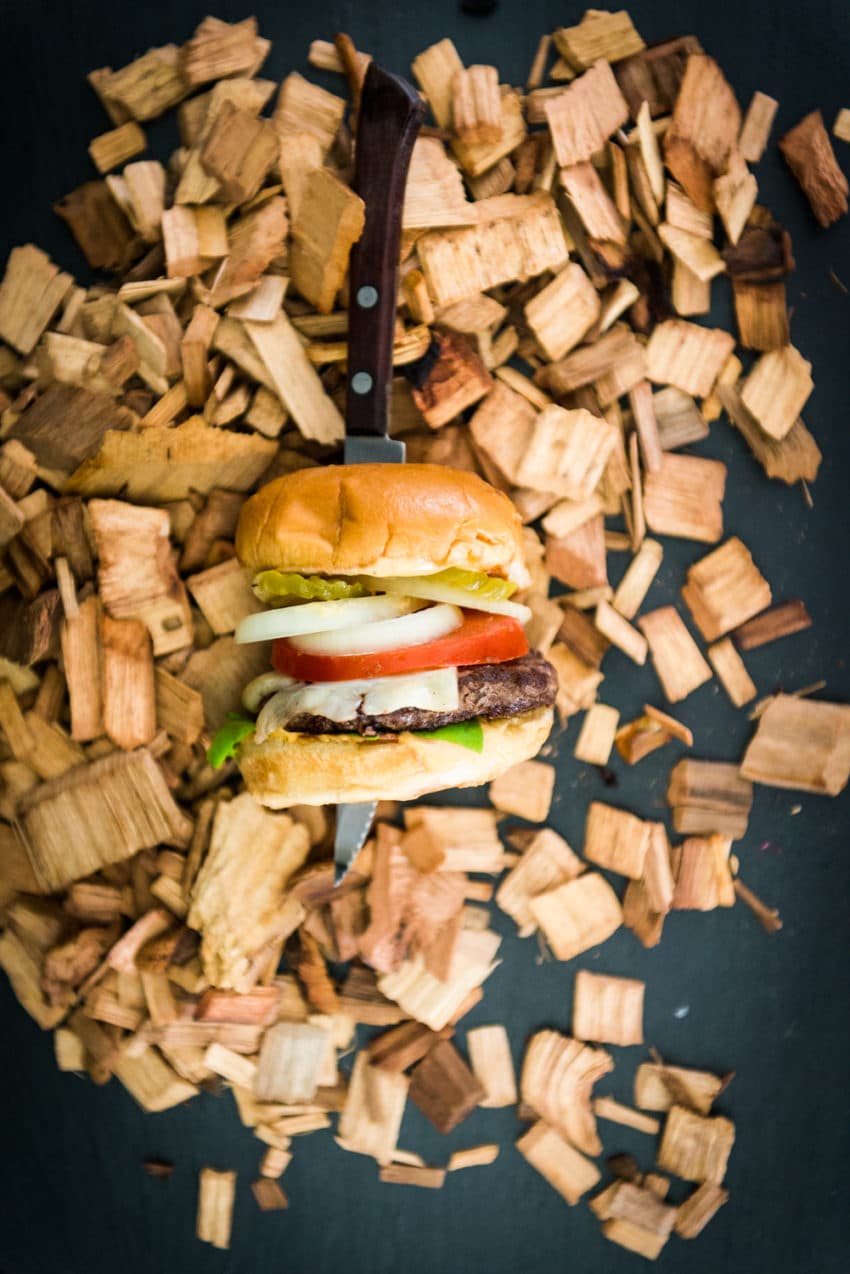
Table of Contents
- TL;DR Quick tips for smoking with wood chips
- Why Wood Chips Are Important for Flavor
- Smoking Process
- Choosing the Right Wood Chips
- How to Smoke with Wood Chips
- Managing Smoke and Temperature
- Tips for Controlling Smoke Intensity for Desired Flavor
- Monitoring and Maintaining the Ideal Temperature for Smoking
- Smoking Techniques for Different Meats
- Fan favorite Recipes on the Smoker
- Safety Precautions and Tips
- Troubleshooting Common Issues
- Too Much Smoke
- Not Enough Smoky Flavor
- Position of Your Wood Chips
- Troubleshooting Temperature Fluctuations and Other Challenges
- Now Get Grilling
- More helpful grilling guides
- FAQs
Whether you’re getting ready for a summer grilling sesh or want to jazz up your smoker recipes, these tips will help you. Read on to level up your grill game and craft smoky dishes that’ll leave your guests begging for more.
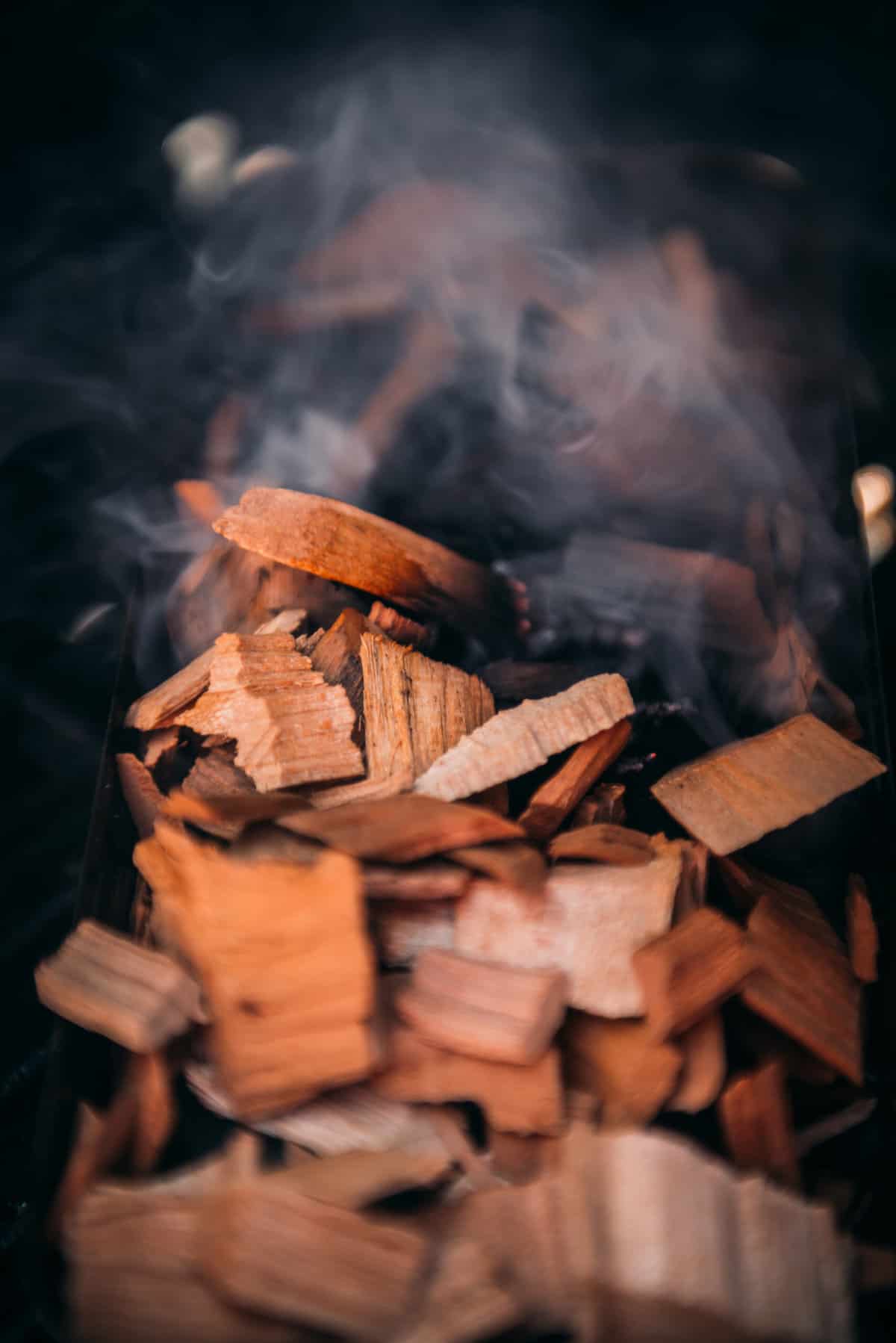
TL;DR Quick tips for smoking with wood chips
- Choose the right wood chips: Hickory and mesquite for robust flavor, apple and cherry for milder, sweet taste. Select wood chip size based on desired burn duration.
- Prepare the grill: Preheat for 10-15 minutes and set up for indirect heat. Use a smoker box or aluminum foil packet to contain the wood chips.
- Add wood chips: Place chips or smoker box/foil packet over hot coals. Aim for ‘blue smoke’.
- Manage smoke and temperature: Add chips every 30-45 minutes. Control smoke intensity with different wood types and smoking duration. Use thermometers to monitor food and grill temperature.
- Different smoking techniques for different meats: Follow specific temperature, smoking time, and internal temperature guidelines for various meats and seafood.
- Storage and safety: Store chips in a dry, cool place. Ensure proper ventilation, follow manufacturer’s instructions, and avoid touching hot wood chips.
Why Wood Chips Are Important for Flavor
Adding wood chips to your grill is one of the best ways to add flavor and a deep smoky aroma to your meals. Whether you’re making smoked baked beans or smoked pork ribs, these little wood wonders can jazz up any dish!
Not sure what grill to even start with? Check out our picks for the best grills of the year.
Smoking Process
The smoking process begins by firing up your smoker and letting the wood chips work their magic. As the smoker reaches that perfect temperature, the wood chips start smoldering and releasing flavorful smoke. This imparts your meat or veggies with that authentic barbecue flavor. With wood chips, the smoke flavor is more subtle than wood chunks or logs, but they are a great tool for everyday grilling on everything from a classic charcoal grill to smoking on your gas grill. We even use them for award-winning cocktails.
Benefits
Smoking takes your grilling game to a whole new level. It’s not just about charring the outside anymore; it’s about infusing every fiber of your meat with that smoky deliciousness. The slow and low cooking process in a smoker helps tenderize even the toughest cuts of meat, turning them into melt-in-your-mouth masterpieces.
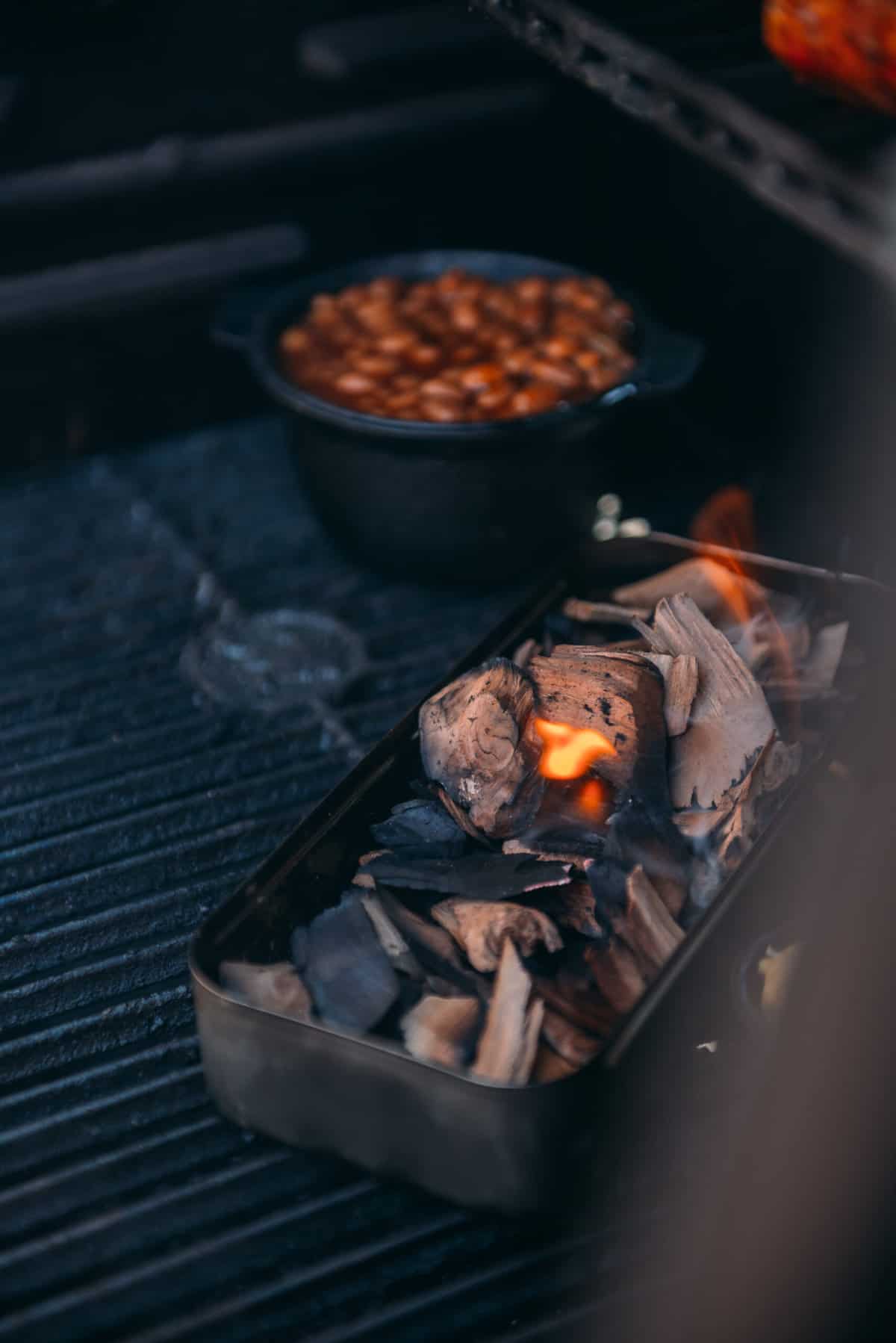
Choosing the Right Wood Chips
The wide variety of wood chips can make choosing the best wood for your smoking session difficult. But don’t worry, we’ll lay out each type of wood chip and which ones are the best for certain types of meat. Check out our wood chip pairing guide here.
Wood Chip Varieties and Flavors
Hickory
Let’s start with the mighty hickory. Known for its robust and assertive character, it brings a bold bacon-like, wood-fired flavor to the party. Hickory chips are the best wood chips for smoking red meat like smoked beef ribs and pork recipes craving that intense, mouthwatering smokiness that leaves a lasting impression.
Mesquite
If you’re up for a wild ride, mesquite is your ticket. Its strong, earthy aroma doesn’t mess around. This flavor-packed technique is ideal for tackling those big, juicy cuts of meat, such as brisket, ribs, and even chicken drumsticks.
Apple Wood
Looking for more of a sweet flavor? Say hello to apple wood chips. They add a delicate, fruity charm to your grilled dishes, making them the best wood chips for smoking poultry and pork. This wood chip strikes a perfect balance of sweetness without overwhelming the natural flavors of the meat, making it perfect for dishes like this smoked spatchcocked turkey.
Cherry
Cherry wood chips bring a unique and seductive flavor profile to the table. With a subtle, mildly sweet smoke, it blends effortlessly with poultry, ham, and lamb. It’s also our favorite choice for smoked duck.
Oak
Oak offers a medium-intensity smokiness with a touch of earthiness, making it a crowd-pleaser for a wide range of delicate meats, especially smoked prime rib. And is our go-to flavor when cooking for crowds.
Alder
Alder adds a gentle and delicate smoky flavor, making them the best wood chips for smoking fish, seafood, and especially smoked pastrami (trust us on this one). It’s often used for wood planks, like cedar-planked salmon. Think of it as the James Bond of wood chips—smooth, sophisticated, and bringing just the right amount of sweet elegance to your grilled dishes.
A Note on Flavors
It’s important to note that not everyone will like a certain flavor of wood chips. For example, you might not like the taste of hickory. If that’s the case, you can always mix and match flavors to find your perfect combination.
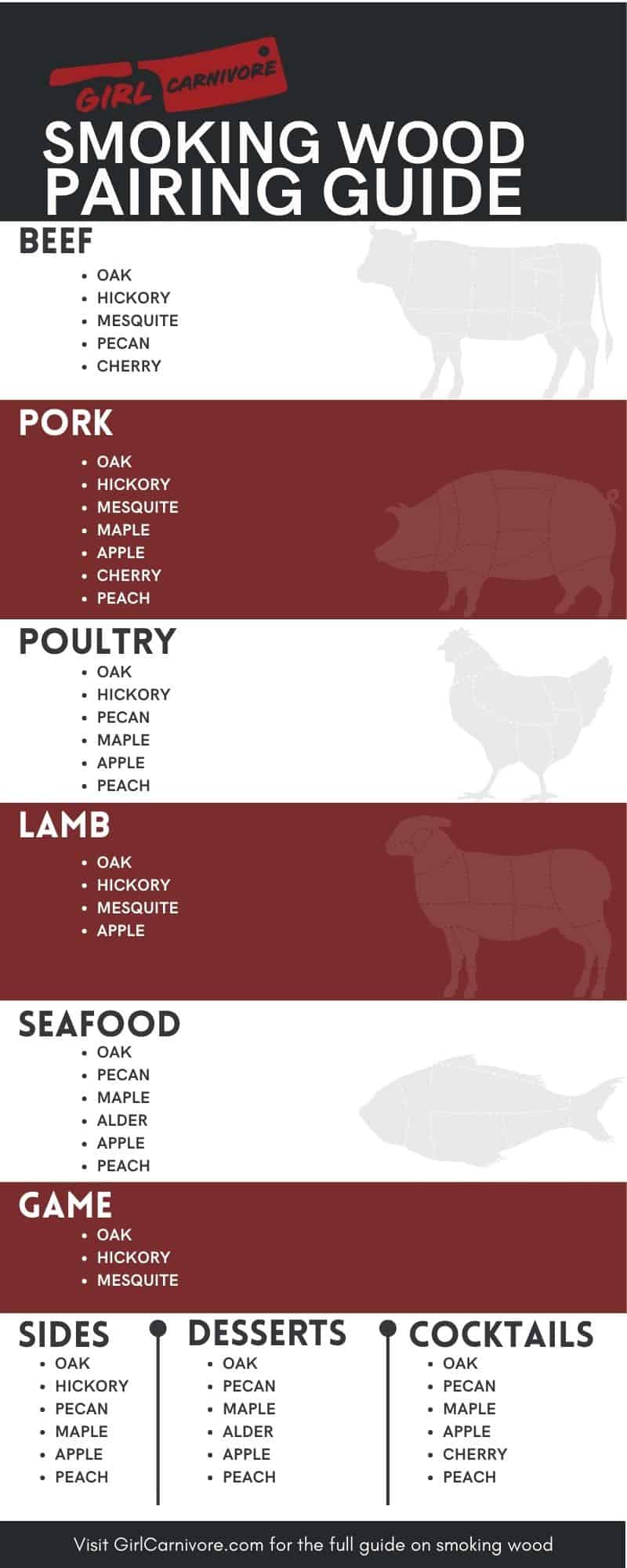
How to Select Wood Chips for Smoking
Here are the key factors you need to consider to find your smoking soulmate:
Wood Type
Each type brings its own distinct flavor profile to the table. Want a mild and subtle taste? Go for fruitwood like apple or cherry. Craving a robust and bold flavor? Embrace the power of hardwoods like oak or hickory. Don’t be afraid to experiment and find your wood of choice that’ll complement your food just right.
Size of Chips
Size does matter when it comes to wood chips. Smaller pieces of wood tend to burn faster, producing quicker bursts of smoke. Larger wood chunks, on the other hand, offer a slower and more prolonged smoking session. Overall, when you buy a bag of wood chips, you will end up with a consistent bag of chips so you don’t have to think about this in the same way as with chunks or splits.
Flavor Compatibility
Consider the flavors you want to pair with your food. Some wood chips, like mesquite, have a strong and assertive taste that pairs beautifully with beef. Others, like pecan or maple, bring a sweeter and milder touch, perfect for poultry or pork.
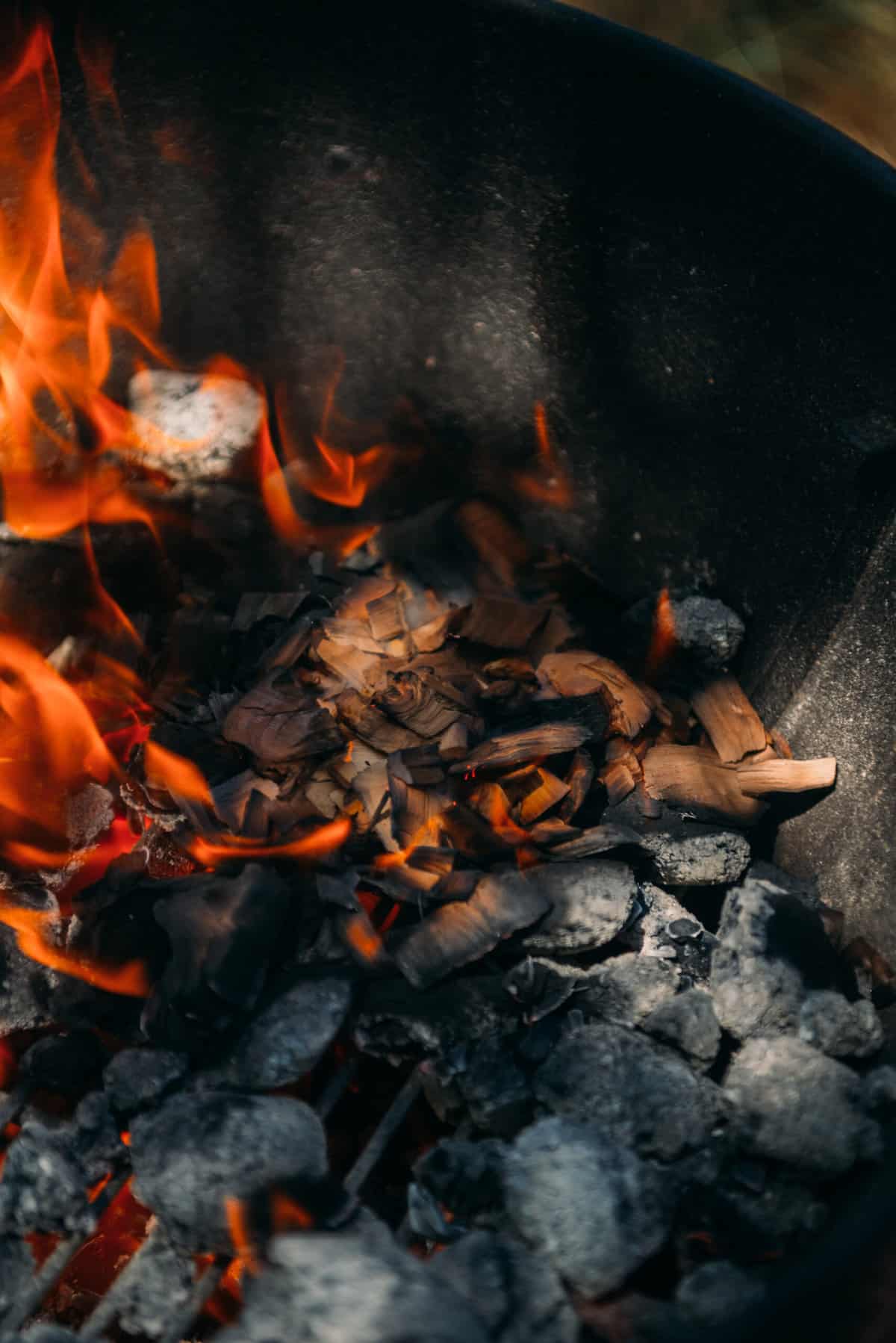
How to Smoke with Wood Chips
Break down the steps for the best smoked flavor.
Setting Up the Grill
Preheating the Grill and Preparing the Smoking Area
To kick off your smoky adventure, start by preheating your charcoal grill. Give it a good 10 to 15 minutes to warm up and reach the ideal temperature for smoking. We want to create a fire for indirect heat so that our wood chips will get nice and smoky.
Meanwhile, take a moment to prepare the smoking area. This involves placing a drip pan filled with water on the cooler side of the grill. This will help regulate the temperature and keep your food moist throughout the smoking process, especially when using dry wood chips.
Using a Smoker Box or Aluminum Foil Packet for Wood Chips
Fill your smoker box up with your preferred wood chips and place it directly on the hot charcoal. The box will release aromatic smoke, infusing your food with that irresistible smoky flavor. If you’re using a smoking on a gas grill, check out our guide.
But don’t fret if you don’t have a smoke box. Grab a sheet of trusty aluminum foil and create a simple foil pouch or packet. Scatter a generous handful of wood chips onto the foil, wrap it up securely, and poke a few holes on top. This will allow the smoke to escape while keeping your wood chips contained. Place the foil packet directly on the hot charcoal.
Adding the Wood Chips
For grilling on a charcoal grill, scatter wood chips directly over hot coals or place your smoker box or aluminum foil packet on top of the hot side of the grill.
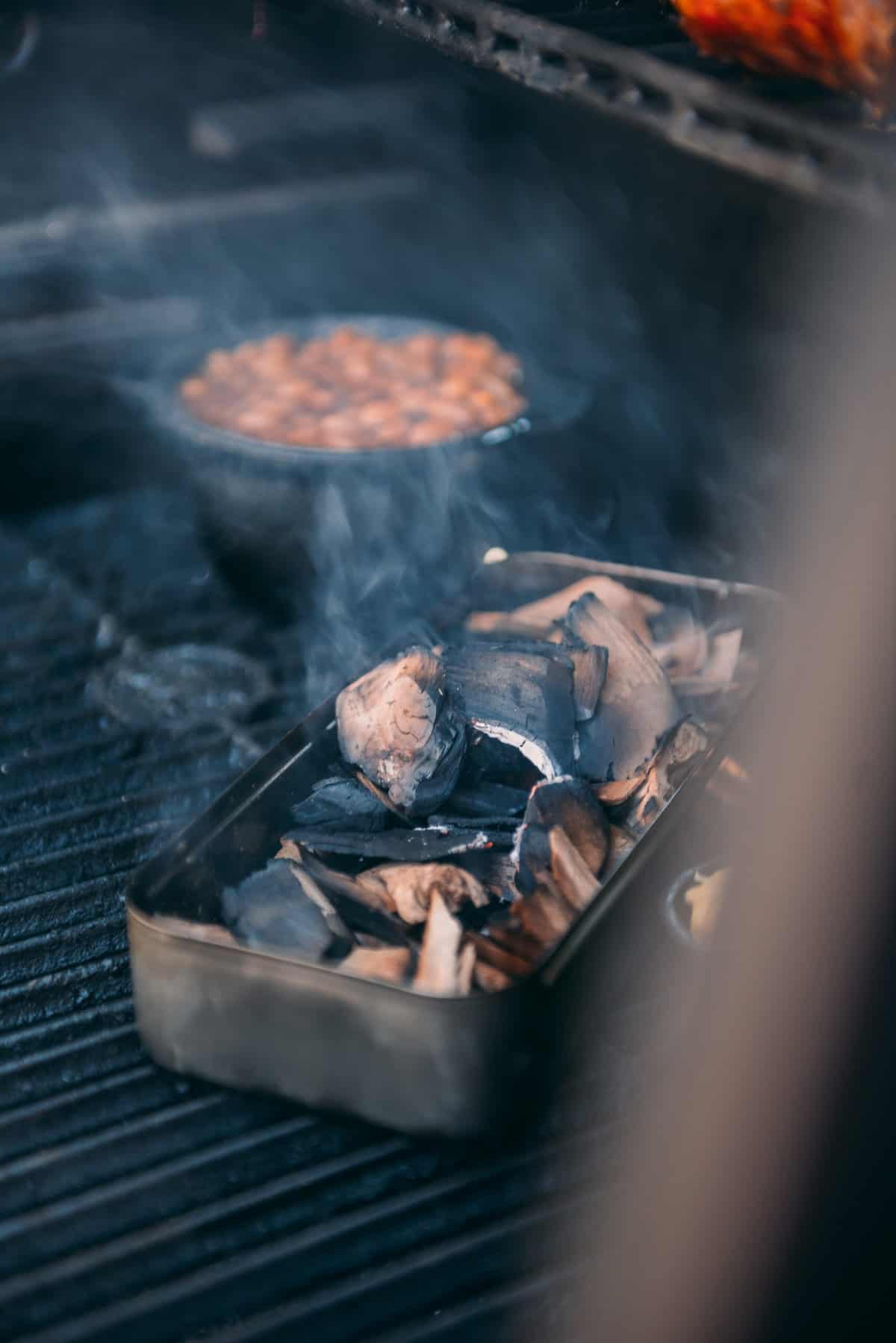
Timing and Frequency of Adding Wood Chips During The Smoking Process
As you start grilling, add a handful of wood chips to the heat source. Let the woodchips flare up initially and burn for 5 or so minutes until the smoke is clear, called ‘blue smoke’ before adding your food. This initial burst of smoke will engulf your food, infusing it with a captivating smoky flavor from the very beginning.
Throughout the smoking process, it’s essential to maintain a steady pace of adding wood chips. Too many, and you risk overpowering your food with an intense smoky flavor. Too few, and you might miss out on that desired essence. Aim to add a handful, or around 1 cup of wood chips every 30 to 45 minutes, depending on the intensity of smoke you desire.
Managing Smoke and Temperature
Tips for Controlling Smoke Intensity for Desired Flavor
- For a milder smoky flavor, opt for fruitwoods like apple or cherry. If you crave a bolder punch, embrace the robustness of hardwoods like Hickory or Mesquite.
- Start with a conservative amount of wood chips and gradually increase if desired. Adding too much wood can create too much smoke.
- For a subtle smoky essence, smoke your food for a shorter duration. If you crave a deeper smokiness, extend the smoking time.
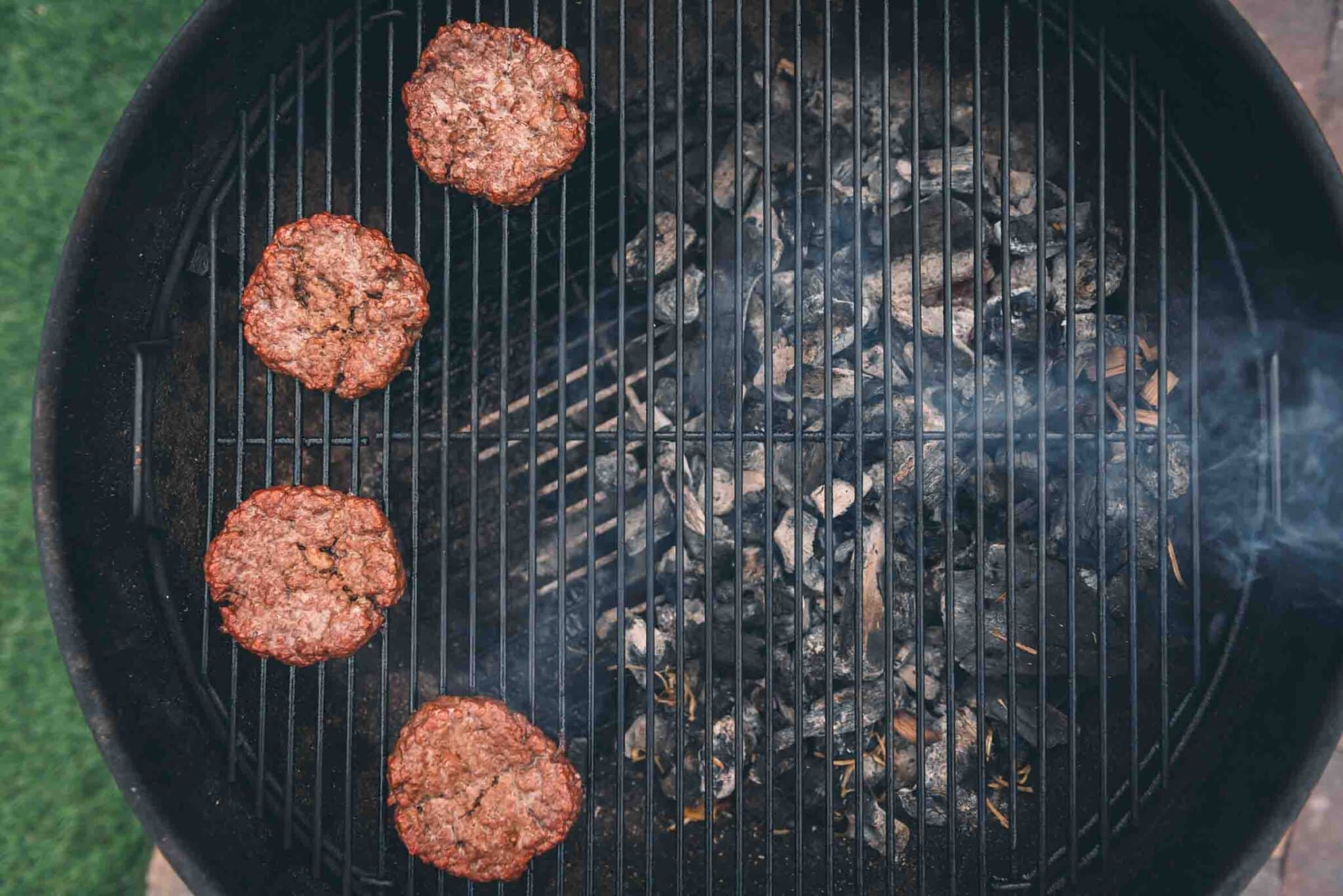
Monitoring and Maintaining the Ideal Temperature for Smoking
A reliable meat thermometer and a quality smoker thermometer are your trusted allies in this flavorful journey. Place the meat thermometer into the thickest part of the food to monitor its internal temperature accurately. Use the smoker thermometer to keep a close eye on the ambient heat inside your smoking chamber.
Regularly check the smoker or grill thermometer to ensure the temperature remains within the desired range. Be prepared to make minor adjustments to the vents or fire as needed.
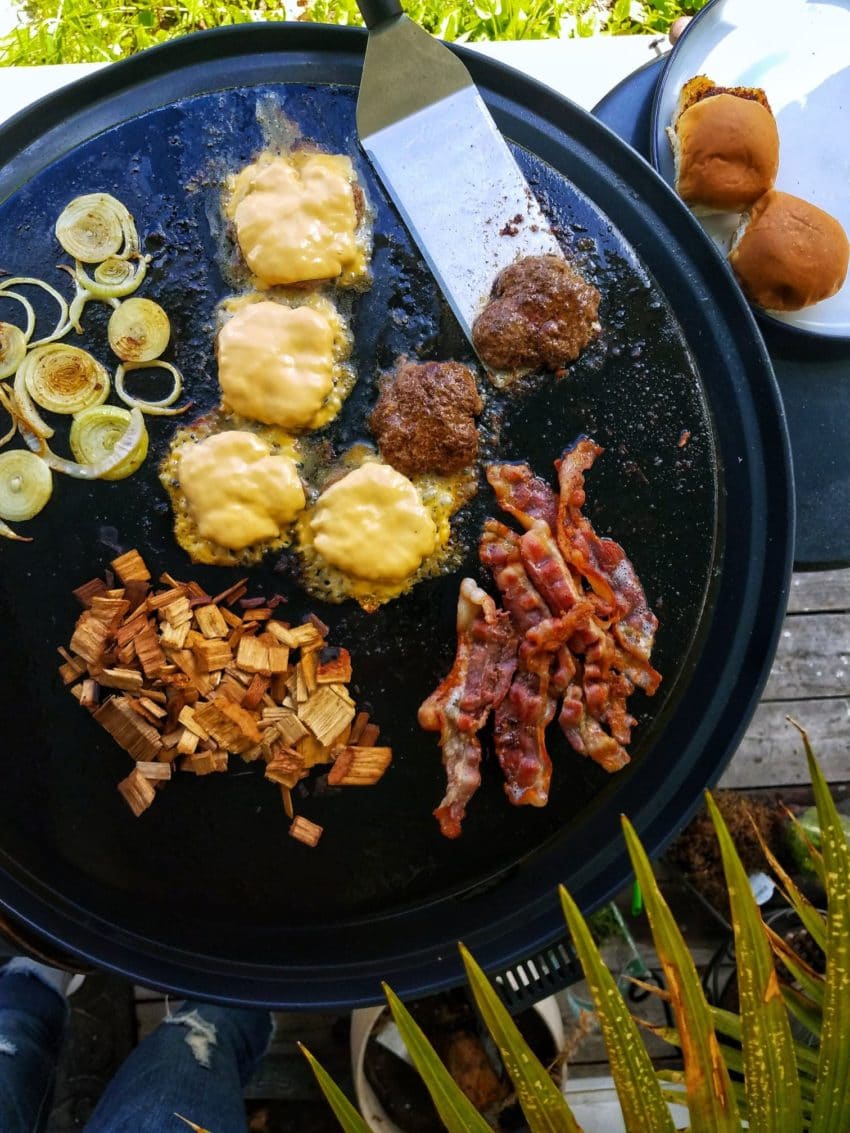
Smoking Techniques for Different Meats
Brisket
For smoked brisket, low and slow cooking is the name of the game. Aim for a temperature range of 225-250°F and smoke it for 10-12 hours for an internal temperature of 200-205ºF.
Ribs
Ribs are a tender temptation when done right. Smoke at a temperature of around 225-250°F for 5 to 6 hours for smoked ribs that fall off the bone. The ribs are done when they reach an internal temperature of 190-210ºF.
Chicken
To achieve smoky perfection with smoked beer can chicken, go for a temperature of 225-250°F and smoke it for about 1.5 hours to 2 hours. Make sure the chicken reaches an internal temperature of 165°F before eating.
Smoking a turkey? Check out our guide for The Best Wood for Smoking Turkey.
Pork Butt and Loin
Whether it’s pork butt or lean bacon-wrapped pork loin, slow and steady wins the race. Here are the recommended temperatures and cooking times for each.
- Smoker temp – 225ºF
- Internal temp – 205ºF
- Cook time – 8-10 hours
- Smoker temp – 225ºF
- Internal temp – 145ºF for sliced, 200ºF for pulled.
- Cook time – 2.5 hours
Seafood
For delicate fish fillets, shrimp, crab imperial, and even smoked scallops, smoke them for a shorter duration. Opt for fruitwood or lighter-flavored wood chips to complement the delicate flavors. Here are the recommended temperatures and cooking times for each.
Fish
- Smoker temp – 225ºF
- Internal temp – 145ºF
- Cook time – 1-1.5 hours
Shrimp
- Smoker temp – 225ºF
- Internal temp – 145ºF
- Cook time – 20-30 minutes
Crab
- Smoker temp – 300ºF
- Internal temp – 140ºF
- Cook time – 40 minutes
Scallops
- Smoker temp – 250ºF
- Internal temp – 145ºF
- Cook time – 35-45 minutes
Fan favorite Recipes on the Smoker
Recipes With Pork
Bacon Wrapped Meatloaf
Appetizer Recipes
Buttermilk Brined Grilled Chicken Wings
Poultry Recipes: Chicken, Turkey & Duck
Traeger Smoked Turkey with Smoked Stuffing
Recipes With Pork
Traeger Pork Butt
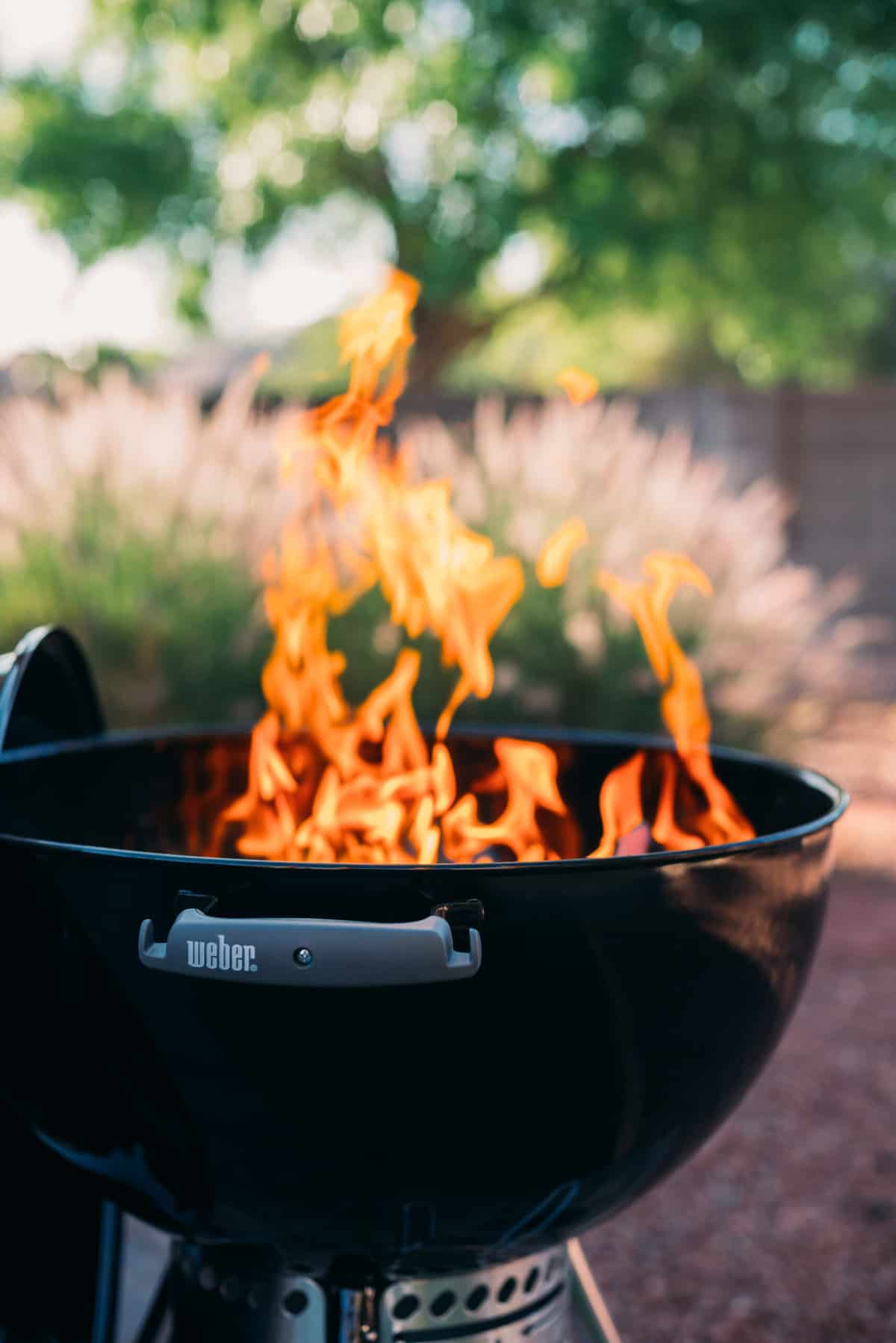
Safety Precautions and Tips
When working with fire like in smoking and grilling, use the best grilling safety.
Storing Wood Chips
To preserve the quality of your wood chips, store them in a cool, dry place away from moisture and direct sunlight. Moisture can cause the chips to deteriorate and lose their smoking potential. Try using airtight containers or resealable bags to keep them fresh.
Safety Tips
Ventilation
When using wood chips, ensure proper ventilation to prevent control of the airflow to the coals. This helps maintain the temperature to want throughout the cook. If the grill becomes too dense with dark smoke, burp the grill to let some of the smoke out, and if it continues, open the grill vents and let the breeze run through. If this happens, remove your food from the grill, as the dirty smoke can have a rancid acrid taste.
Fire Prevention
Keep a watchful eye on potential fire hazards. Maintain a safe distance between flammable materials and your gas grill because we want a blaze of flavor, not panic. Wood chips can catch fire. It’s wood and fire. If this happens, use long tongs to carefully move the foil packet or smoker box to the cooler side of the grill and cover the lid of the grill to choke of the oxygen supply to smolder the fire.
Manufacturer’s Orders
Read the manufacturer’s instructions like they’re your grilling Bible. They know their products better than anyone, and following their guidance ensures a smooth and safe cooking experience.
Caution Is Key
Avoid touching the wood chips with your bare hands, and use heat-resistant gloves or tongs to keep those fingers unburnt and ready to savor your smoky creations.
Mind the Flames
Keep flames in check by being mindful of your grill’s heat levels. Avoid flare-ups by adjusting the burners and maintaining a safe distance between the flames and your wood chips.
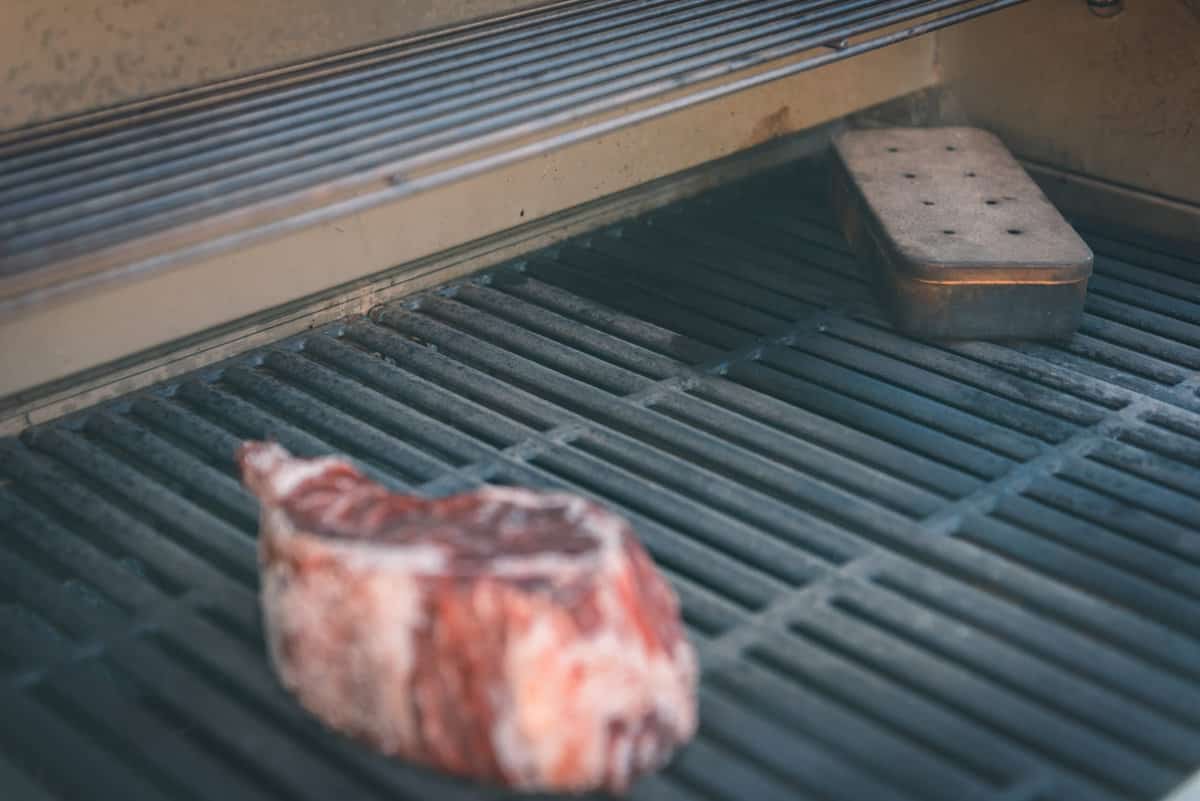
Troubleshooting Common Issues
Too Much Smoke
If your grill or smoker is producing an overwhelming amount of smoke, it can result in an acrid, unpleasant taste in your food. To tackle this issue, make sure you’re using the right type and quantity of wood chips.
Opt for milder woods, such as fruit or nut woods, which produce a subtler smoke flavor. Additionally, reduce the number of wood chips you use or try spreading them out in the smoker box or foil packet to control the smoke output. Remember, moderation is key.
Not Enough Smoky Flavor
If you’re not getting enough smoke flavor in your grilled or smoked dishes, it’s time to amp up the smoky goodness. Start by checking the quality and freshness of your wood chips. Old or wet wood chips may only produce a little smoke.
Consider using a combination of different woods or experimenting with stronger varieties like mesquite or hickory to intensify the smoky taste. Also, make sure that your charcoal smoker or grill maintains a consistent temperature, as lower temperatures can hinder the production of smoke and add fresh wood chips every 30 to 45 minutes
Position of Your Wood Chips
The position of your wood chips within the grill or smoker can also impact the smoke flavor. You want to place your wood chips directly over the heat source, allowing them to smolder and produce smoke.
Troubleshooting Temperature Fluctuations and Other Challenges
Air Leaks
If you notice inconsistent temperature readings in your smoker or grill, start by checking for air leaks, which are often visible if the smoke is billowing out around the lid, the built-in temperature gauge, or any other seams on the manufactured pieces of your grill that isn’t an open-air vent Seal any gaps or openings using heat-resistant materials like aluminum foil or gaskets. Additionally, be mindful of the positioning of your vents to regulate airflow effectively.
Fuel Supply
Ensuring a steady supply of fuel is essential for temperature control. Maintain a consistent supply of wood chips to avoid sudden drops or spikes in temperature. Regularly monitor and replenish the charcoal as needed throughout the smoking process.
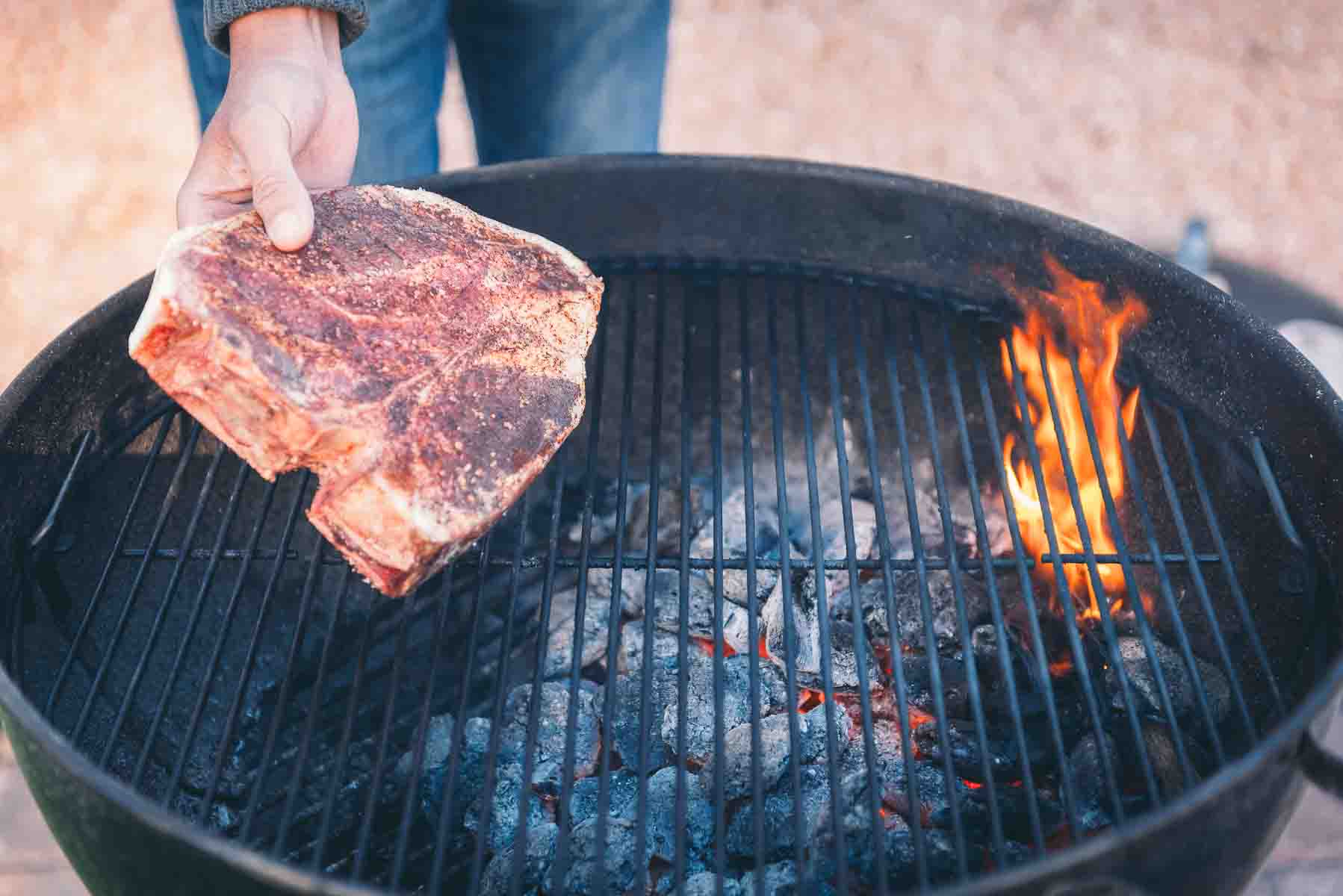
Now Get Grilling
You’re one step closer to taking your smoking game from dull to delicious. From choosing the right wood chips to prepping them for the smoker and practicing proper grill safety, you have everything you need to master the art of smoking with wood chips! And remember, don’t hold back on experimenting and exploring different flavor profiles because that’s where the magic happens! Let us know if you try any of these tips in the comments below.
More helpful grilling guides
FAQs
Beef: For beef, stronger and more robust flavors work well. Consider using wood chips like mesquite, hickory, or oak, which impart a bold and smoky taste.
Pork: Pork pairs nicely with a variety of wood chips. For traditional barbecue flavors, try using applewood, cherry, or pecan chips. These impart a sweet and fruity aroma that complements the natural sweetness of pork.
Poultry: When smoking chicken or turkey, lighter and fruitier wood chips work best. Opt for fruitwood chips like apple, cherry, or maple, which add a subtle sweetness to the meat without overpowering its delicate flavors.
Seafood: For seafood, mild and delicate wood chips are preferable to avoid overpowering the natural flavors. Alder, cedar, or fruitwood chips like apple or cherry provide light and slightly sweet smoke that enhances the seafood’s taste.
We don’t recommend soaking wood chips as soaked wood chips let out more steam than smoke, which is not what we’re going for. When cooking with chips directly on hot coals, for safety, have a water bottle nearby to handle any flare-ups.
Yes! We highly recommend using dry wood chips as they ignite faster and produce a more intense smoke flavor compared to soaked wood chips.
For the first 3 hours, add a handful of wood chips every 25 to 45 minutes, depending on the intensity of smoke you desire, your grills heat, and how fast the chips are burning.
225-250ºF. This temperature range is perfect for smoking and produces a nice smoke flavor for any type of wood chips.
Yes! Check out our guide for using wood chips on a gas grill with a smoker box!
Make sure not to add too many wood chips at once, as this can produce too much smoke flavor at the beginning. Start with one cup. Also, the flavor of wood chips can affect the intensity. Wood chips like mesquite and hickory will have a more intense smoke flavor than apple wood or cherry.
If you don’t have a smoker box, there are still two easy methods to use wood chips for smoking:
– Foil Packet Method: Take a sheet of aluminum foil and place a handful of wood chips in the center. Fold the foil tightly to create a sealed packet, leaving a small vent on top for smoke to escape. Place the foil packet directly on the hot coals or on the grill grates over the heat source. As the packet heats up, the wood chips will begin to produce smoke.
– Pellet Tube Method: A pellet tube is a small cylindrical container filled with wood pellets. Simply fill the tube with your desired wood pellets and light one end. Let it burn for a few minutes until it starts producing smoke. Place the lit pellet tube on the grill grates or directly on the charcoal. The tube will continue to smolder, releasing smoke throughout the cooking process.
Yes! Wood chips can catch fire easily as they are made of wood. So, keep a pair of tongs nearby to move off the fire source if needed.
Use a reasonable amount of wood chips and adjust the smoking time according to the thickness and type of meat you’re cooking. Keep an eye on the internal temperature of the meat with a thermometer, making sure it reaches the desired doneness while still soaking up that mouthwatering smokiness.
Most hardware stores sell wood chips, or you can purchase them online!
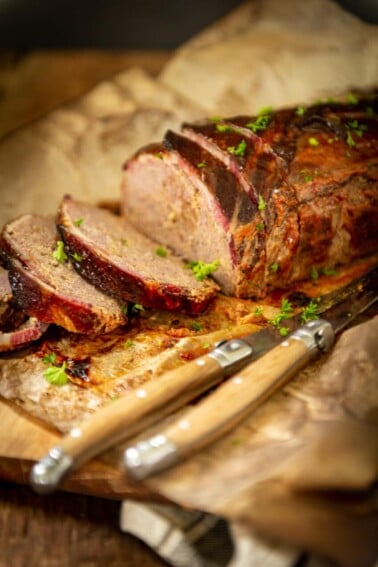
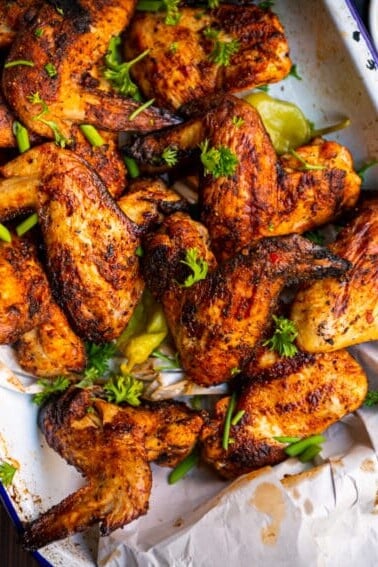
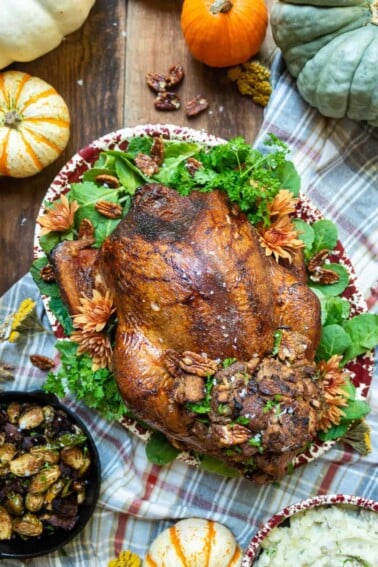
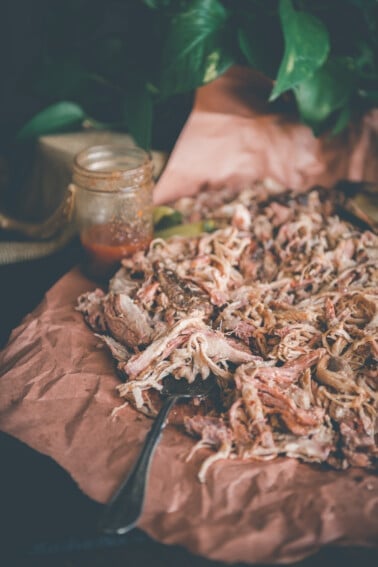
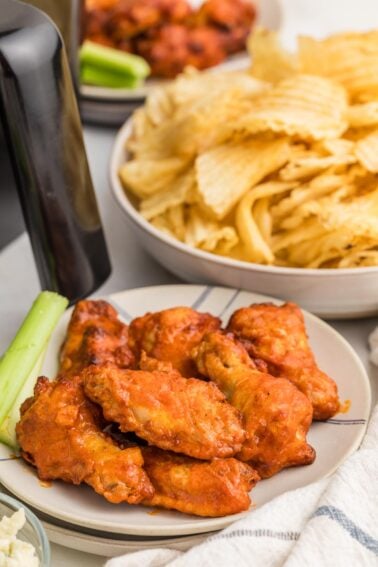
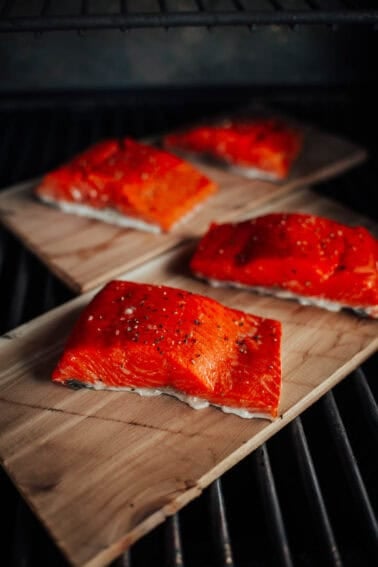
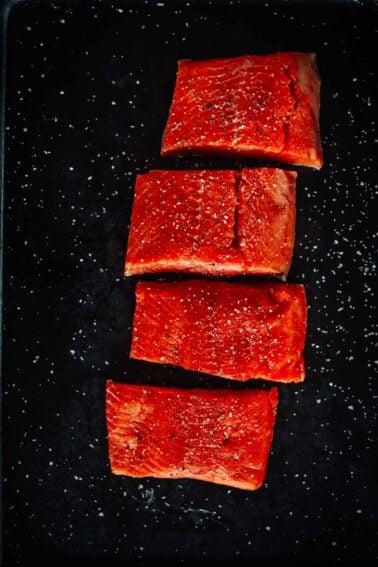
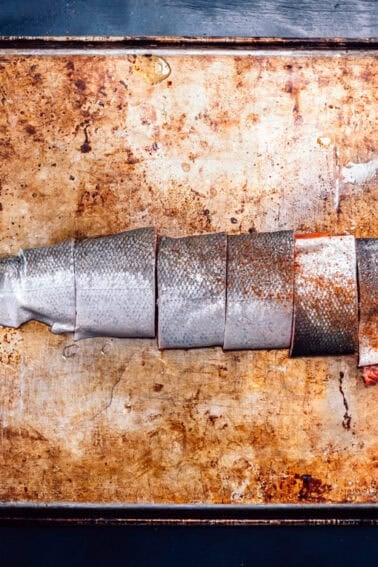


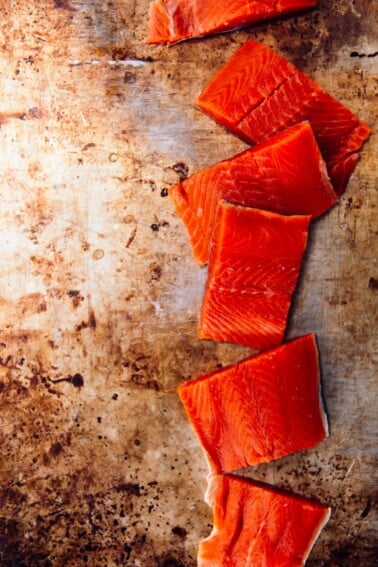
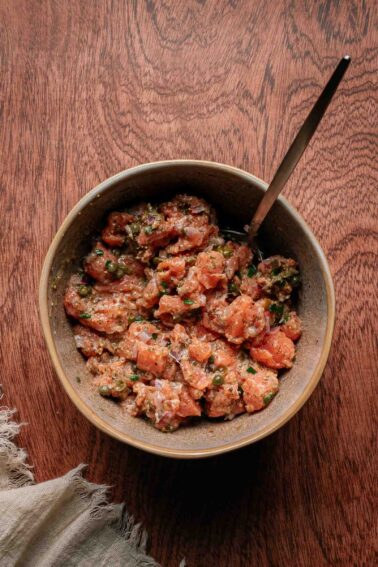
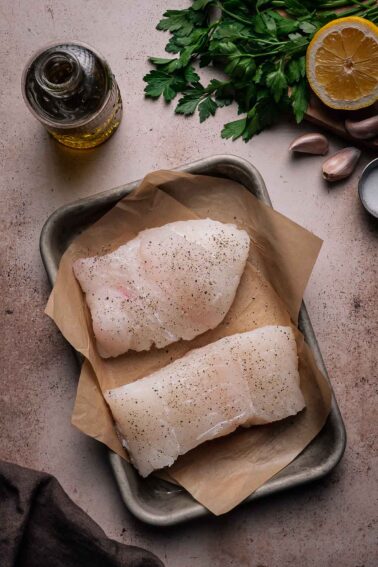
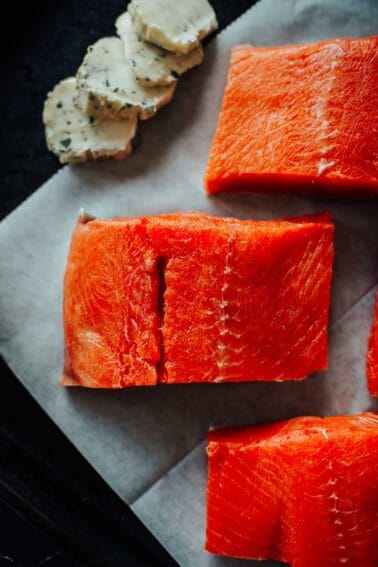









I have been grilling for over 30 plus years. I have always soaked wood no matter if I am doing burgers to a brisket and I have never seen it steam meat.
Hey Earnest, thanks for the feedback. When soaking chips, the water in the chips create steam before smoke, not necessarily steaming the meat, but the chips. It takes longer for the chips to produce smoke, if you are doing a quick cook (like burgers) things could be done before the chips even start to smoke.
Cheers to another 30 years of awesome grilling!